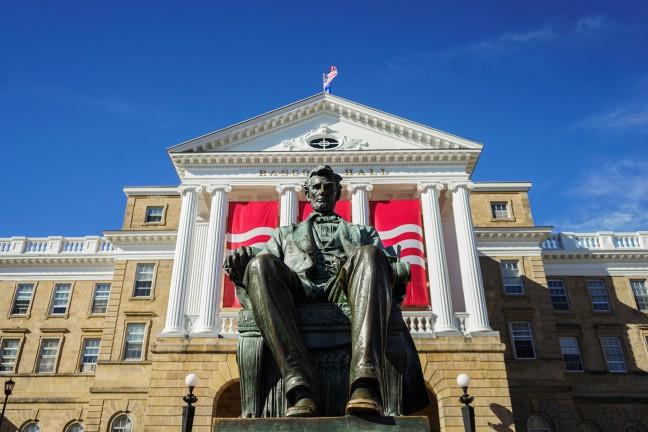Free speech is a right promised to all Americans through the Constitution and is an integral part of democracy which must be protected. But too often, people have the wrong idea about free speech.
In extreme instances, they believe it gets them off scot-free every time they commit the crime of hate speech. More often, though, pleading one’s right to free speech allows people to spout alternative facts and baseless theories without consequences. Why is this wrong? Why isn’t this free speech?
To understand that, we must examine the roots of free speech. In Western society, the legal protection of free speech stems from the Enlightenment movement. The Enlightenment was brought about by a revolution in science which caused a mix of conflicting ideas and academic debate never seen before. The debate in the international scientific community led to the discussion and study of non-scientific realms of knowledge — namely, society and politics.
Enlightenment thinkers believed in rationalism, the idea that nothing could be accepted on faith and everything had to be backed up with reason. And they believed through rationalism, they could move forward humanities understanding of everything, creating better societies and better people.
These were the ideals the United States was founded upon. Our founders believed the legal protection of free speech would engender the debate and discussion of ideas. Debate tears apart bad ideas, preventing them from being implemented in any way. Debate also validates good ideas because when no one can find fault with an idea, there is no reason not to implement it.
Editorial Board: Free speech and power in a protest-driven era
Everyone who enters a discussion — with either good or bad ideas — comes out better informed and with an understanding of what the best plan of action is. In a democratic form of government, we want debate because it makes the ideas government implement better. Free speech is a tool that improves governance.
The legal protection of free speech was created with the intention of encouraging people to back up with evidence their ideas in debate, free of the fear of consequences. It was not created to let people yell anything from misleading statements to outright hate speech.
The University of Wisconsin Board of Regents has proposed policy that would mandate suspension or expulsion of students who “repeatedly disrupt free speech on campus.” This was encouraged by efforts in the State Legislature by Republicans to protect free speech. But the measures taken will only discourage free speech.
The conservative Charles Koch Institute even recently voiced its objection to the policy in an official statement.
“Punishing students for their expression is not how you promote free speech,” the statement said. “Imposing mandatory minimum punishments without even defining for students what actions will subject them to that punishment will stifle campus dialogue rather than enrich it.”
It is my hope that this influential conservative group will convince other conservatives to encourage more free speech. The ability to speak freely is not a political issue — it is the basis of democratic politics, and therefore should be promoted by everyone who takes part in them. Those who impede free speech pose a danger to democracy.
I believe this is why the rule has been proposed. The Board, much like the Koch Institute, wants free speech protected from people who impede it. Their intentions are good, but there are three major issues with it.
One, disruption can take many forms and is sometimes justified — and no formal definition of disruption has been created. There is no firmly stated red line where one crosses from a heated discussion between two people, to one person disrupting the other person’s ability to speak.
This is a problem because students will be discouraged from debate if they don’t know at what point they run the risk of getting kicked out of school. Debate is never something that should be discouraged at an academic institution.
Two, disruption is a form of protest and banning it is undemocratic. I would support the proposal if it stated in clear terms the only forms of disruption banned were physically disrupting someone speaking freely. Otherwise, the rule could be misinterpreted to stop peaceful protest by students, of people they don’t agree with. This would create a culture where we all keep our opinions to ourselves, further isolating people who hold different beliefs.
War of words: Proposed legislation reignites tensions on campus over free speech
Third, some forms of speech deserve to be disrupted. Lies, misleading statements and hate speech should not be protected under any circumstance. People saying these things will scream at the top of their lungs that “Free speech is my right!” These people use their ability to speak freely to insult and mislead, not to debate with the intention of finding the best ideas.
Their rude and/or derogatory words should get them punished for disturbing the peace. Will this rule protect hate-filled people who hide behind their false notion of free speech? That should not be its intention.
But it is possible that students rightfully opposing a man spouting hate speech could be accused of disruption of free speech by that same man when the police show up, getting them kicked out of school, and getting him out of whatever fine or imprisonment he actually deserved. While this is unlikely, the prospect would discourage students from confronting these abusers of free speech.
This rule would be detrimental for UW. It would reduce dialogue, diversity of ideas and debate — the whole point of free speech — while emboldening those who misuse free speech to spread hate and lies.
Board of Regents: Do you really want to create a campus where students are afraid to voice their opinions?
Harry Quick ([email protected]) is a freshman studying economics.




















